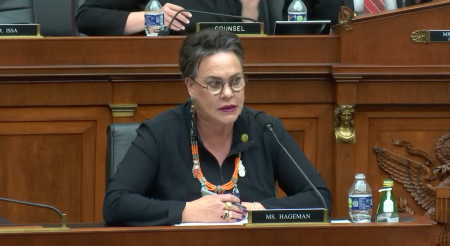“This country is spending absolutely too much,” U.S. Sen. John Barrasso (R-Wyoming) relayed in an Instagram reel . “If we’re going to raise the debt ceiling — and the House has passed a bill to do just that — it has to be tied to substantive changes in the future ways [the United States Congress] spend money.”

According to the U.S. Department of the Treasury, the debt ceiling allows the Treasury to continue borrowing money to pay the nation’s already-spent bills. Debt ceiling bills, which have been increasingly used as a political football, are currently a negotiating tactic by congressional Republicans who are demanding spending cuts be included in the legislation in exchange for a higher debt limit.
If a deal isn’t reached by a certain date (this time it is estimated by June 5), the country runs out of money. America defaults on its debt obligation, the economy plunges in imminent collapse, and affects markets nationally and across the globe, with devastating impacts, so says Secretary of the Treasury Janet Yellen.
“We have learned from past debt limit impasses that waiting until the last minute to suspend or increase the debt limit can cause serious harm to business and consumer confidence, raise short-term borrowing costs for taxpayers, and negatively impact the credit rating of the United States,” Yellen wrote in a letter to Speaker of the House Kevin McCarthy (R-California).
During a town hall meeting in Kemmerer on May 5, Rep. Hageman (R-WY) was plain-spoken. “I don’t want to raise the debt limit. But we’re in a position that we’re going to have to do something. But we also need to be cutting spending.”
In April, Hageman voted in favor of a House bill to both raise the debt limit by $1.5 trillion, or through March of 2024, whichever comes first, and to bring spending levels for some federal programs down to where they were two years ago. The House barely approved the bill which would also limit spending to 1% annual growth.
“Today’s bill is a major step towards restoring fiscal sanity, as well as reigning in the administrative state and setting us back on the trail to energy independence,” Hageman stated in a press release on April 26. She added that she would vote “no” on a debt-ceiling increase if it wasn’t tied to spending cuts.
After the bill passed in the House, the U.S. Department of Transportation criticized reductions in U.S. transit projects as well as highway infrastructure maintenance and improvement projects. Here is the Cowboy State, the proposal would lead to 80 fewer rail safety days in 2024, and would also reduce federal funding for transit and highway infrastructure projects across the state by $24 million. The proposal would also shut down services at two air traffic control contract towers.
The bill, however, was dead-on-arrival in the Senate. Democrats and the President Biden expressed an unwillingness to go that far to cut federal spending, impacting many states, including Wyoming.
Sens. Cynthia Lummis and Barrasso have yet to vote on a debt ceiling bill. In the past, they both have stated they would support it if there were spending cuts attached to the legislation. “Recent Treasury projections have reinforced the urgency of addressing the debt ceiling,” said Senator Lummis.
Senate Republicans, including both Barrasso and Lummis, wrote in a letter on May 9 to Senate Majority Leader Chuck Schumer (D-New York), urging President Biden to take action. “The House has taken a responsible first step in coming to the table with their proposals. It is imperative that the president now do the same.”
The president has refused negotiating for months which has led both sides of the aisle to realize that there is only a matter of days to avoid a default, with devastating consequences to the economy. Last Wednesday, Speaker McCarthy told reporters there were “a number of places that we are still far apart.”
Then Thursday morning, the House recessed without a deal.
With only a few days left, the two sides, if they reach a compromise, still need to craft a bill that can get through both chambers with bi-partisan support. Earlier this month, Lummis applauded House Republicans for their united approach to the debt-ceiling. “I know how hard it is for the House, especially House Republicans to come together because we think for ourselves, and we tend to act for ourselves,” Lummis praised her colleagues.
Louisiana Rep. Garret Graves, who is one of the negotiators picked by the House Speaker to get a deal done, told reporters when asked about a debt-ceiling deal coming together anytime soon, he responded with a targeted response.
“Democrats right now are willing to default on the debt” because of their staunch opposition to new regulations over the over the Supplemental Nutrition Assistance Program, which is a food stamp program. When Graves was asked if Republicans would be willing to drop their demands on the issue of the Debt Ceiling bill, as the White House wants, Graves replied emphatically: “Hell no, hell no, not a chance.”





